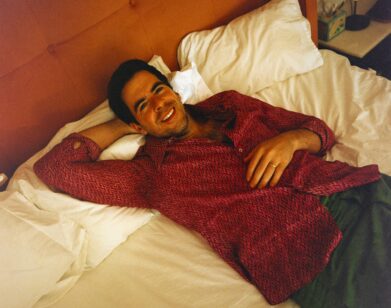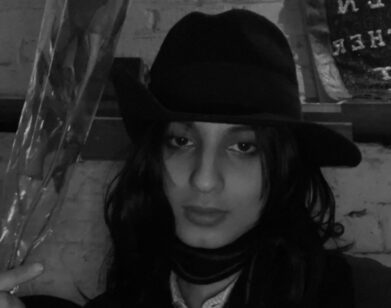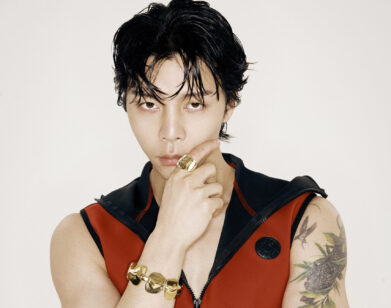In the Middle with Hozier

ABOVE: HOZIER. PHOTO COURTESY OF ALEX LAKE
If there’s one thing that’s brought Andrew “Hozier” Byrne to the music scene, it’s passion. With his gritty, soulful, and blues-infused voice, the Irish singer-songwriter—who first surfaced last year with hit “Take Me To Church”—has continued to filter his passion for storytelling, social issues, and honesty throughout his music. Earlier in 2014, Hozier showed off his chops once again with his second EP From Eden—a preview of his self-titled debut.
Throughout his songs, Hozier has taken on issues of hate, domestic abuse, and violence—topics that aren’t often covered in favor of love and relationships. While some tracks do cover those subjects, Hozier has used eponymous debut album (due tomorrow) to really explore the best and worst parts of himself. Accompanying his debut record, Hozier will be touring throughout the U.S. and Europe through the end of the year.
We caught up with Andrew Byrne on what makes him nervous, his knack for storytelling, and releasing his first record.
ILANA KAPLAN: Why did you decide to go with the moniker “Hozier”?
ANDREW BYRNE: Hozier is a part of my full name. Andrew Hozier Byrne is my full name. There’s a long story of where it comes from on my grandmother’s side. I used to be under Andrew “Hozier Byrne.” After the first EP, I just wanted to shorten it to Hozier. It was quite a mouthful. I just thought it was easier to remember.
KAPLAN: What’s the theme behind your record coming out?
BYRNE: I suppose there’s no one theme. There are a lot of recurring themes. It deals a lot with personal liberations—finding yourself, accepting yourself, and making sense of yourself. Ultimately it’s just trying to be honest about some of the more wonderful and awful things of your day-to-day.
KAPLAN: What’s the meaning behind the song “Cherry Wine?” I’ve seen a lot of different interpretations.
BYRNE: It’s a love song, but it’s about some of the more awful parts of love. It’s a song about violence: domestic violence and domestic disputes. It’s about an abusive relationship and someone who is trying to justify it to themselves.
KAPLAN: How did you decide you wanted to be a musician?
BYRNE: I think it was always on my mind when I was a young kid. As I sang and played more, I realized that it was something I got more joy out of than most things. By the time I was 15 or 16, I was writing. When I was in college, I had an opportunity to do some work with a label here at home. It conflicted with my exam schedule, but I just knew: I knew that there was nothing more I wanted to do. Everyone I looked up to as a teenager was a musician.
KAPLAN: What do you want fans to get out of your upcoming debut record?
BYRNE: I suppose, nothing. I hope people connect with it. If people are able to connect with it, then great. To be honest, the biggest reason I write music and became a musician was to create the amount of joy that I felt about music to anyone else. To me, that’s a job well done.
KAPLAN: With regards to your music, what’s the inspiration for your songs? Do you work off of your own experiences?
BYRNE: The songs come from quite a personal place. As I grow, I try to visualize the songs. I think of the people as characters and step back a little bit and think about the world they live in. They do start from quite a personal place. I try to go from there.
KAPLAN: What’s been the most exciting experience you’ve had so far in the music industry?
BYRNE: I would say being given the opportunity to play at music festivals, to meet people who inspire me and remind me that I’m doing what I love. I’ve never felt as nervous or heart-poundingly nervous as meeting people who inspire me and I’m in awe of.
KAPLAN: Who are some of your biggest musical influences?
BYRNE: Biggest musical influences would be people like Nina Simone and Tom Waits. A huge amount of writers like Leslie Feist and Paul Simon. My musical education was grounded in blues and Chicago blues—John Lee Hooker and Otis Redding. Certainly I think Nina Simone is close to my heart.
KAPLAN: I feel like over the past few months you’ve blown up. How has that transition felt for you?
BYRNE: Hectic. It’s been very rewarding. I think it’s hard to taken in those moments as you’re going because everything you want is happening. You’re very busy so you don’t get a chance to appreciate it. I’m not the kind of person to pat myself on the back or anything like that, so I feel like I have a lot of work to do still beyond this record. I am thrilled, though. It’s nice to take a breather and reflect on those sweet moments. I just remember New York and the crowd—they were so supportive. It feels amazing. It’s a shock because you don’t think about how busy you are—you just think about the sentiment that you feel when you’re making music. You’re not thinking about the whirlwind of it.
KAPLAN: How did you develop a voice for storytelling? Are there some lyrics or works of writing that helped you with your writing?
BYRNE: Absolutely. I’ve said James Joyce, A Portrait of the Artist as a Young Man and Dubliners. There are a lot of recurring themes that I resonated with when I read A Portrait of the Artist as a Young Man. There are a few nods to that. I think Ireland has a fantastic tradition of storytelling—it has an oral tradition whereby history was carried down through songs and tales. I have a bit of a love affair with fairytales and some of the ideas of Irish mythology, like Oscar Wilde and W.B. Yeats who captured a lot of that very beautifully. I was never academically driven in English, but, again, Tom Waits is a perfect example of an influence. He writes so immaculately and paints so perfectly a world and the characters within it. There are writers like that who are my influences, vivid and gifted storytellers.
KAPLAN: What’s been the hardest subject to write and/or sing about?
BYRNE: That’s a tough one. Certainly with anything, it’s some of the more personal stuff that cuts to the bones when you’re dealing with the more awful parts of yourself; who you are when you’re on your own. I think a lot of my first experiences being close to somebody on the record—maybe loving somebody who’s quite damaged was difficult to write about, I suppose.
HOZIER’S SELF-TITLED DEBUT ALBUM COMES OUT OCTOBER 7.






